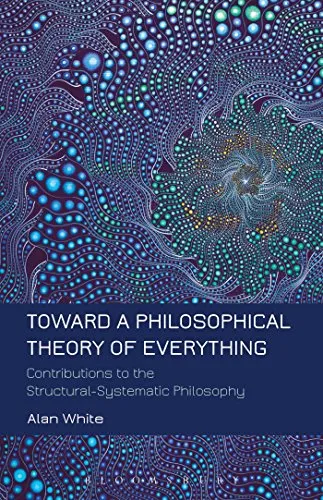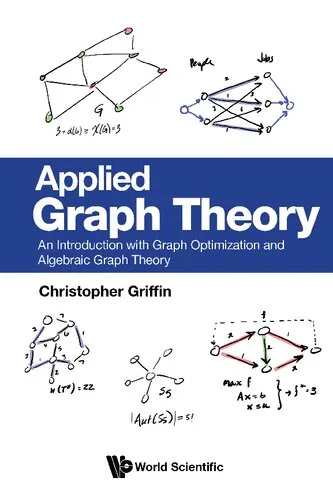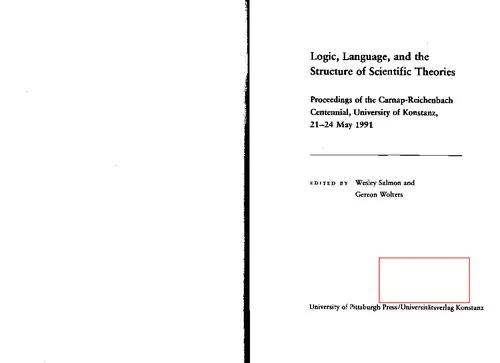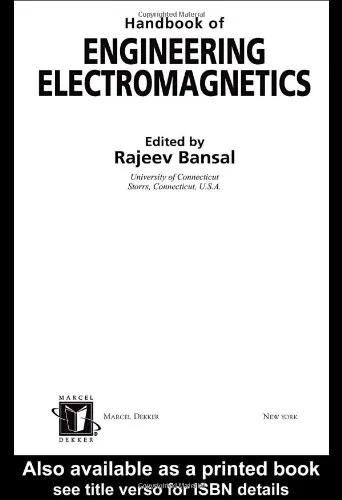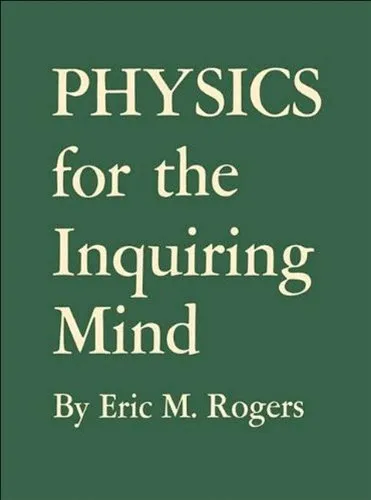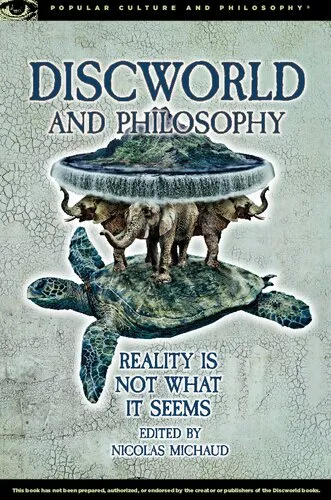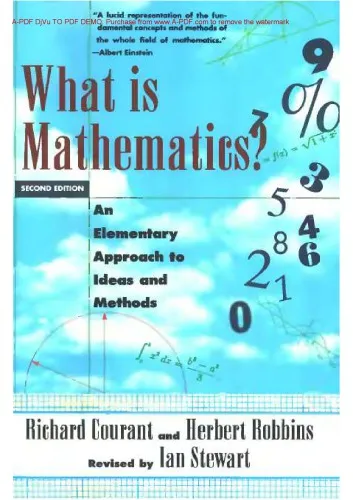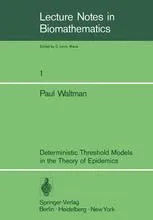Toward a philosophical theory of everything : contributions to the structural-systematic philosophy
4.0
بر اساس نظر کاربران

شما میتونید سوالاتتون در باره کتاب رو از هوش مصنوعیش بعد از ورود بپرسید
هر دانلود یا پرسش از هوش مصنوعی 2 امتیاز لازم دارد، برای بدست آوردن امتیاز رایگان، به صفحه ی راهنمای امتیازات سر بزنید و یک سری کار ارزشمند انجام بدینکتاب های مرتبط:
معرفی کتاب
کتاب Toward a Philosophical Theory of Everything: Contributions to the Structural-Systematic Philosophy اثری است تأملبرانگیز که به بررسی عمیق امکان وجود نوعی Theory of Everything در فلسفه میپردازد. این اثر تلاش میکند به وسیلهٔ رویکرد Structural-Systematic فلسفه، به پرسشهای فیلسوفانه دربارهٔ ساختار واقعیت و نظم کلی آن پاسخ دهد. در این معرفی، به مرور جنبههای اصلی این کتاب، دستاوردهای کلیدی، نقلقولهای مشهور و اهمیت این کتاب خواهیم پرداخت.
خلاصهای مفصل از کتاب
این کتاب به دنبال دستیابی به پاسخی عمیق برای یکی از اساسیترین پرسشهای فلسفی است: آیا میتوان نظریهای جامع ساخت که به تبیین همه جنبههای واقعیت بپردازد؟ نویسنده از خلال ساختاری نظاممند (systematic) و ترکیب مفاهیم پیچیده مرتبط با معرفتشناسی، هستیشناسی و فلسفه علم تلاش میکند زمینهای تحلیلگرانه برای چنین پرسشی فراهم آورد.
نویسنده آغاز کار خود را با بررسی مبانی فلسفی از افلاطون و ارسطو شروع میکند و سپس به اندیشمندان عصر مدرن مانند کانت، هگل و هایدگر میپردازد. از این زاویه دید، رویکردی Structural به فلسفه معرفی میشود که بر تعامل و اتصال مفاهیم جهانی تأکید دارد. او در نهایت پیشنهاد میکند که Theory of Everything نه تنها ممکن است، بلکه ضرورتی اساسی برای درک نظم جهان است.
دستاوردهای کلیدی
- استفاده از مفهوم Structural-Systematic برای تحلیل فلسفی.
- تشریح امکان پیوند مفاهیم بنیادین هستی و آگاهی.
- ایجاد چشماندازی کلان برای اتحاد میان فلسفه علم و متافیزیک.
- تأکید بر نقش زبان و منطق در شکلگیری ساختار واقعیت.
- ارائه روششناسی منسجم برای فهم روابط پیچیده میان کل و جزء.
نقلقولهای مشهور از کتاب
"The quest for a Theory of Everything is not merely physical nor mathematical; it is fundamentally philosophical."
"Language itself is a structural system; it mirrors and shapes our understanding of reality."
"To grasp the interconnectedness of all things is to glimpse the fundamental unity of existence."
چرا این کتاب مهم است؟
کتاب Toward a Philosophical Theory of Everything اثری جامع و بنیادین است که فلسفه را از موضع جزیی و منفرد به موضع کلنگر و سیستمی ارتقا میدهد. در دنیایی که علم به سمت تخصص گرایش پیدا کرده، این اثر میکوشد دریچهای به سوی گفتگویی میان رشتهها باز کند. مخاطبان این کتاب میتوانند از دانشجویان فلسفه و علوم انسانی تا فیلسوفان حرفهای و متفکران میانرشتهای باشند. علاوه بر این، دیدگاه سیستماتیک ارائه شده در این اثر، راهی جدید برای تفسیر مسائل بنیادین بشری فراهم آورده است.
Introduction
"Toward a Philosophical Theory of Everything: Contributions to the Structural-Systematic Philosophy" is a thought-provoking exploration of the intellectual framework that seeks to unify the diverse threads of philosophical inquiry under a cohesive and systematic structure. Authored by Alan White, this book delves deeply into the theory that philosophy—and human understanding as a whole—can be organized into a coherent system of interrelated ideas. By addressing critical questions about metaphysics, knowledge, ethics, and the nature of existence, the book lays the groundwork for what could be considered a philosophical "theory of everything." This text is especially valuable to those engaged in structural or systematic approaches to philosophy and will appeal to philosophers, academics, and general readers seeking clarity and comprehension in complex philosophical matters.
In this book, readers are guided through an ambitious intellectual journey. It challenges fragmented approaches to philosophy that often isolate disciplines and ideas into silos. Instead, it promotes the concept that philosophical topics are interconnected by underlying patterns and structures. This structural-systematic approach is not only a methodological innovation but one that aims to redefine how we think about the nature of human knowledge itself. Now, let us take a closer look at what this book has to offer.
Detailed Summary of the Book
"Toward a Philosophical Theory of Everything" is structured to guide the reader through several key areas of philosophy while integrating them into a larger, interconnected framework. The book begins by addressing foundational questions in metaphysics, such as the nature of being and existence. It explores whether reality can be understood in universal terms, emphasizing structural coherence as a necessary component of metaphysical understanding.
The text then shifts to epistemology, where it examines the structures of knowledge: how we know what we know, and how such knowledge can be systematically connected. By incorporating insights from contemporary science, logic, and language theory, the author demonstrates that philosophy need not exist in isolation from other disciplines. Instead, it has the potential to provide a unifying perspective.
Ethical and moral philosophy forms another essential part of the book, as it examines the relationships among values, obligations, and human purpose. The author argues for a structural approach to ethics that recognizes the systematic interplay of individual moral principles within broader societal frameworks.
Finally, the book concludes with implications for the philosophy of mind, cultural analysis, and even aesthetics, providing readers with an expansive, integrative vision of human thought—a true philosophical theory of everything. White's work is rigorous in its analysis but remains accessible to thoughtful readers outside the most specialized academic circles.
Key Takeaways
- Philosophy can and should strive to achieve unity by addressing its disciplines—metaphysics, epistemology, ethics, and aesthetics—as interdependent and structurally coherent.
- Structural-systematic philosophy is a methodological framework that redefines how we organize and interpret philosophical knowledge.
- Philosophical systems should not reject the advancements of science but instead incorporate them as part of a comprehensive understanding of reality.
- Through rigorous structure and integration, understanding transcendence becomes achievable in both practical and theoretical terms.
Famous Quotes from the Book
"To seek a philosophical theory of everything is not to seek the elimination of mystery, but rather to embrace the challenge of coherence in the face of complexity."
"All knowledge, if truly understood, is part of an interconnected web of meaning."
"The structural-systematic approach does not minimize human diversity; it finds unity in the diversity."
Why This Book Matters
Philosophy, in its modern academic form, often suffers from fragmentation, with individual thinkers or schools focusing narrowly on particular issues while failing to see the bigger picture. This book is significant for its attempt to unify the philosophical landscape under what can be aptly described as a systematic framework. This ambitious project seeks not just to clarify isolated ideas, but to create connections that show philosophy as a holistic endeavor.
Moreover, White’s work matters because it challenges contemporary philosophers, scientists, and thinkers to think beyond disciplinary boundaries. Where other books theorize without structure or remain content within isolated specialties, "Toward a Philosophical Theory of Everything" presents a structured philosophy that respects complexity while finding underlying unity.
In a world desperate for coherence amidst rapid intellectual and cultural fragmentation, this book is more relevant than ever. It invites its readers to step out of narrow specialization and engage with the full spectrum of human knowledge, making the case for philosophy as a timeless, unifying pursuit.
دانلود رایگان مستقیم
شما میتونید سوالاتتون در باره کتاب رو از هوش مصنوعیش بعد از ورود بپرسید
دسترسی به کتابها از طریق پلتفرمهای قانونی و کتابخانههای عمومی نه تنها از حقوق نویسندگان و ناشران حمایت میکند، بلکه به پایداری فرهنگ کتابخوانی نیز کمک میرساند. پیش از دانلود، لحظهای به بررسی این گزینهها فکر کنید.
این کتاب رو در پلتفرم های دیگه ببینید
WorldCat به شما کمک میکنه تا کتاب ها رو در کتابخانه های سراسر دنیا پیدا کنید
امتیازها، نظرات تخصصی و صحبت ها درباره کتاب را در Goodreads ببینید
کتابهای کمیاب یا دست دوم را در AbeBooks پیدا کنید و بخرید
